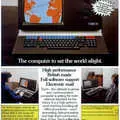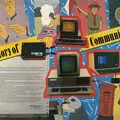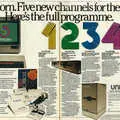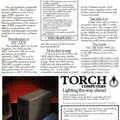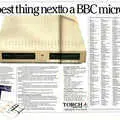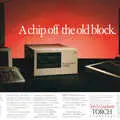
Torch Advert - October 1983
From Personal Computer World
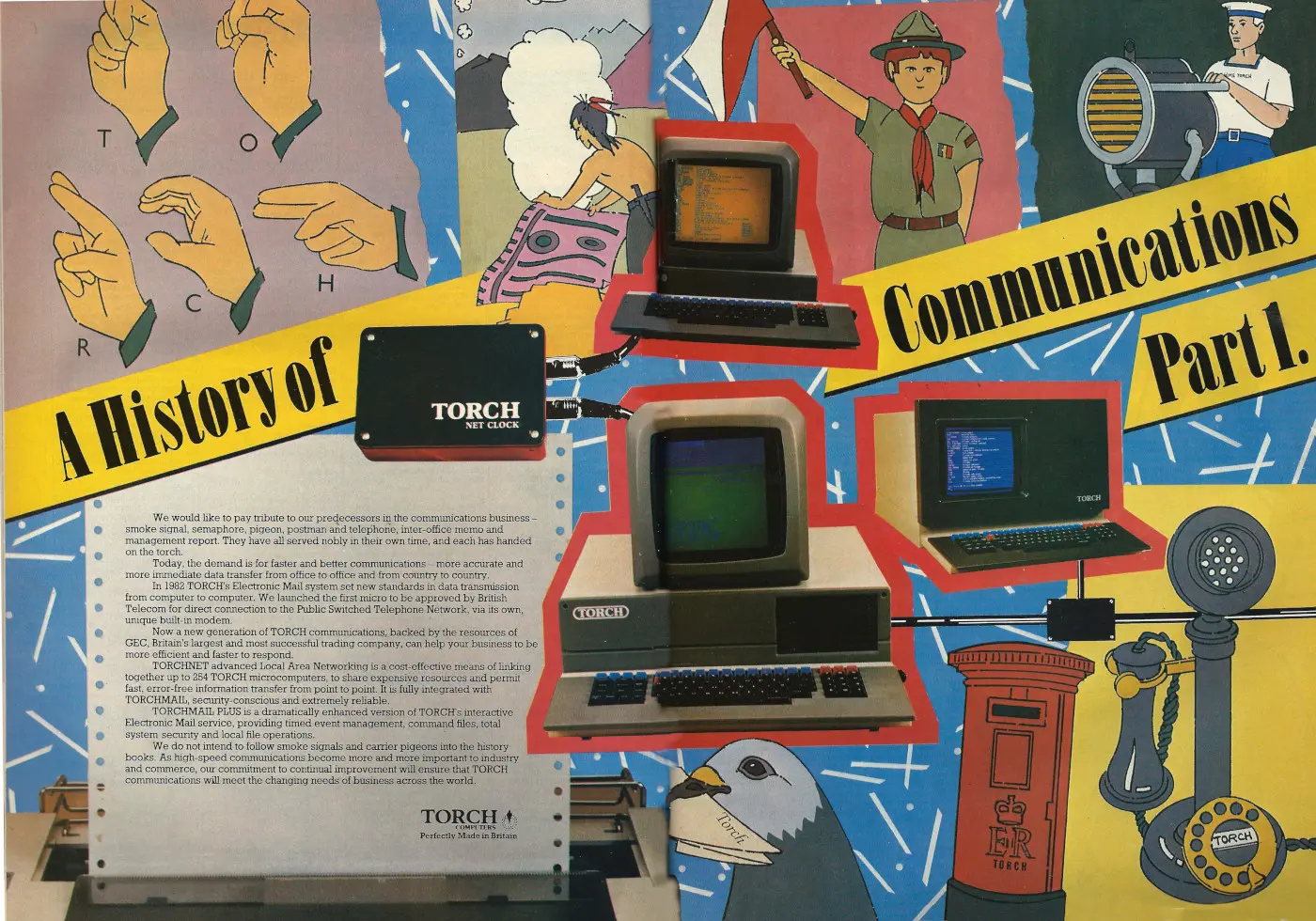
A history of communications: part 1
This colourful and quintessentially 80s advert from Torch was one of two sequential adverts in Personal Computer World and provides a nice summary of the company's output so far.
This includes the original Communicator (on the right, now known as the C-series) as well as the 300 model (back), the curious Torch Net Clock (on the left), and the company's new 700 model (front).
The latter machine contained a third processor, in addition to a 6502 and a Z80, in the shape of a Motorola 68000, and ran Unix System 3.
This delayed the shipping of the 700 by several months, as apparently porting Unix to the machine had proved "difficult"[1].
Both the 700 and the Series 300 "intelligent workstation" were launched in the US on Independence Day, with the other advert of the pair claiming that this gave "every British businessman the right to be independent of imported micro technology".
It was also rumoured that Torch had paid William Woollard of the BBC's Tomorrow's World programme some £4,000 to speak at the UK launch of these 68000-based "Super Torches"[2].
This particular advert also points out that the Torch Communicator (C-Series) was the first micro to be approved by BT for direct connection to the UK's PSTN telephone network, as well as being one of the first ever to support email "out of the box" - the RFC822 proposal that defined internet email had only been published in August 1982, a few months after the Communicator was launched.
The following year, Torch released the Graduate - a mostly-IBM-compatible complete add-on unit for the BBC Micro, which although a good idea in principal was hobbled by the fact that it was connected to the micro over its 1MHz bus, reducing the speed.
Torch had started as a joint venture with Acorn - the two companies had shared offices for a while and Torch was even set to become the business arm of Acorn, before a disagreement on policy led to a severing of links, except for the fact that Acorn remained contracted to supply Torch with BBC boards for its computers[3].
It had flirted with cash-rich GEC, which had come close to taking a majority stake in the company before the deal fell through[4] but then in the June of 1984 the company was unexpectedly bought back outright by Acorn[5].
It also appeared to have grown weary of the obvious torch metaphors, and had changed from "Lighting the way ahead" to "Perfectly made in Britain" as a tag line.
Although it had been bought back by Acorn, the two companies continued with what were essentially conflicting products.
Torch had already sold 6,000 of its Z80 disk pack/second processor units before Acorn launched its own Z80 unit; the two companies produced version of Acorn's Econet and both companies had higher-end business machines - Acorn with its ABC and Torch with its Unicorn 68000 unit.
The 68008 in Torch's unit - the same chip as used in Sinclair's QL and essentially a version of the "superchip" 68000 but with a restricted 8-bit data bus - was up against Acorn's not-yet-ready National Semiconductor 16023, later renamed the 32016.
Both companies, unsurprisingly, had a different spin on the issue, with Torch's chairman Bob Gilkes stating:
"The two companies have an exceptionally high degree of compatibility in products, in strategic thinking and in management style. We believe this new grouping will become a major British entry in to the world market for communicating business systems".
Acorn's Alex Reid had more of the axe-man's view, saying:
"Torch's established position in business systems is a natural outlet for some of Acorn's own business systems products, and a rationalisation of the two companies' development efforts will give a substantial boost to both Acorn's and Torch's market prospects".
National Semiconductor, or NatSemi as it was frequently referred to, had had the dubious honour of reporting the semiconductor industry's largest loss (up to that point) the year before, when it blamed a general decline in the US chip market for its defecit of $17 million[6].
Date created: 05 September 2014
Last updated: 11 December 2024
Hint: use left and right cursor keys to navigate between adverts.
Sources
Text and otherwise-uncredited photos © nosher.net 2026. Dollar/GBP conversions, where used, assume $1.50 to £1. "Now" prices are calculated dynamically using average RPI per year.
